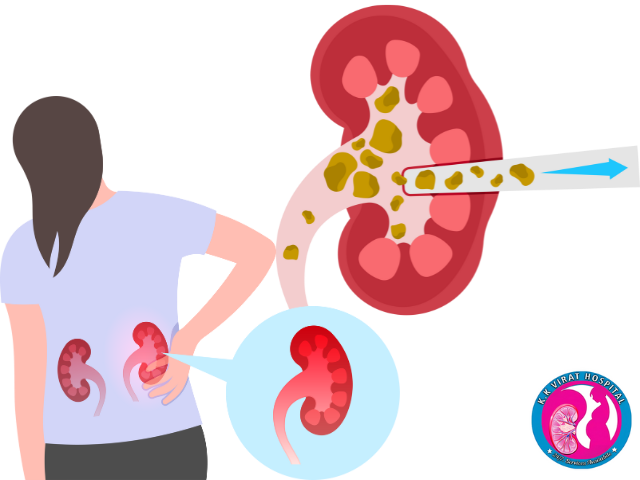Prolonged kidney stones can cause severe pain and complications. Don’t delay seeking treatment. Contact us today to book your consultation with top urologists in Karimnagar for affordable PCNL surgery at KK Virat Superspecialty Hospital.
Say Goodbye to Kidney Stones with Advanced PCNL Surgery at KK Virat Super Speciality Hospital, Karimnagar
Understanding PCNL Surgery
Percutaneous Nephrolithotomy (PCNL) is a minimally invasive surgical procedure used to remove large kidney stones or stones in the upper ureter. The procedure involves making a small incision in the flank region to access and break down stones with precision.
PCNL is highly effective for stones larger than 2 cm and eliminates the need for open surgery. With minimal complications and a high success rate, PCNL is an optimal treatment for complex kidney stones.

Who Should Consider PCNL Surgery?
PCNL is recommended for patients who:
- Have kidney stones larger than 15mm, which cannot be treated with lithotripsy or ureteroscopy.
- Experience frequent kidney stone formation.
- Suffer from multiple stones in the kidney or upper ureter, leading to urinary retention.
Kidney Stone Passage Timeline
- Less than 2mm: 8 to 10 days
- 3-4mm: 12 to 20 days
- 4-6mm: 30 to 45 days
- Greater than 6mm: 6 months to 1 year
Risk Factors for Kidney Stones
- Obesity
- Genetic predisposition
- Dehydration
- High calcium supplement intake
- Excessive consumption of animal protein
ICD-10 Codes for Kidney Stone Conditions
- Kidney and ureteral calculus: N20
- Pelviureteric junction (PUJ) obstruction: N20
- Vesicoureteric junction (VUJ) obstruction: N20.1
- Urinary tract calculus: N20.9
- Suburethral and ileal conduit stones: N21.8
- Hydronephrosis with renal/ureteral calculous obstruction: N13.2
PCNL Surgery: Diagnosis, Procedure & Recovery
Diagnostic Tests Before PCNL
Before undergoing PCNL, the following tests may be required:
- Urinalysis
- Imaging tests (CT KUB, X-rays, ultrasound, MRI)
- Blood urea nitrogen (BUN) test
- Complete blood test
PCNL Procedure Overview
- Anesthesia & Incision: The patient is administered general and spinal anesthesia. A small (1 cm) incision is made in the flank area.
- Nephroscope Insertion: A thin, flexible nephroscope is inserted through the incision under X-ray guidance.
- Stone Removal: The surgeon breaks the stone into smaller fragments or removes it entirely using microforceps.
- Stenting (If Required): In some cases, DJ stents are placed to help flush out stone fragments naturally through urine. These stents are removed within 10-14 days.
Post-Surgery Expectations
- Mild dizziness due to anesthesia.
- Blood in urine for a few days to weeks.
- Temporary pain due to stents, managed with prescribed medications.
- Hospital discharge within 24 hours if no complications arise.
- Antibiotics and pain relievers prescribed for recovery.
Recovery Guidelines After PCNL
- Stay hydrated to help flush out stone fragments.
- Temporary burning sensation during urination may occur.
- Resume daily activities within a few days.
- Regular follow-up visits to monitor recovery progress.
Advantages of PCNL Surgery
- Minimally invasive with a small incision
- No visible scars
- Minimal blood loss
- Faster recovery compared to open surgery
- Short hospital stay
- High stone-free success rate (>90%)
Why Choose KK Virat Super Speciality Hospital for PCNL in Karimnagar?
KK Virat Super Speciality Hospital in Karimnagar is the ideal choice for PCNL, offering expert care from experienced urologists with over 15 years of expertise. As a 50-bedded hospital, we are committed to providing patient-centric care at affordable prices, utilizing cutting-edge technology in urology and gynecology to serve Karimnagar and the surrounding areas.
Our state-of-the-art medical facilities and advanced surgical equipment ensure precision and safety in every procedure. We also provide seamless assistance with insurance approval, making the process hassle-free for our patients. To enhance patient convenience, we offer free transport services and follow-up consultations, ensuring continuous care and support.
Our hospital is dedicated to delivering the best patient care with empathy and compassion, creating an environment where patients feel at home. Choose KK Virat Super Speciality Hospital for exceptional healthcare with a personal touch.
Don’t let kidney stones disrupt your life. Contact KK Virat Super Speciality Hospital, Karimnagar, for expert care and effective treatment!
Book Your Appointment Today
Scheduling your PCNL surgery at KK Virat Super Speciality Hospital is simple:
- Call Us Directly: Get in touch with our medical coordinators to schedule an appointment with an expert urologist.
- Direct Visit: You can visit our hospital directly by carrying your previous medical records if you have a medical history. However, admission will be based on the doctor’s recommendation.
What size of stones are treated with the PCNL procedure?
PCNL (Percutaneous Nephrolithotomy) is used to treat large kidney stones, typically those greater than 2 cm (20 mm) in size. It is especially effective for staghorn calculi or stones that cannot be removed through other minimally invasive procedures.
What is the duration of PCNL?
The PCNL procedure usually takes 1 to 3 hours, depending on the stone’s size, location, and complexity.
Is PCNL surgery painful?
PCNL is performed under general anesthesia, so patients do not feel pain during the surgery. However, mild discomfort or pain may be present after the procedure, which can be managed with pain medications.
Does PCNL have a high success rate?
Yes, PCNL has a high success rate of 85-95% in removing large kidney stones. It is considered one of the most effective treatments for complex or multiple stones.
Who should not undergo PCNL surgery?
PCNL may not be suitable for:
- Patients with poor overall health who cannot tolerate surgery
- Patients with bleeding disorders
- Pregnant women
- Those with severe kidney infections or untreated urinary tract infections (UTIs)
Is there insurance coverage for the PCNL procedure in Karimnagar?
Many health insurance plans cover PCNL surgery. It is advisable to check with your insurance provider or hospital in Karimnagar to confirm coverage and reimbursement details.
What foods should I avoid for kidney stones?
To prevent kidney stones, avoid:
- High-calcium supplements without medical advice
- High-oxalate foods (spinach, nuts, chocolate, beets)
- Excessive salt and processed foods
- Sugary drinks and sodas
- Excessive animal protein (red meat, poultry, eggs)
What are the kidney stone pain areas?
Kidney stone pain (renal colic) is usually felt in:
- Inner thigh (as the stone moves down the urinary tract).
- Lower back or side (flank pain).
- Abdomen.
- Groin or lower pelvis
What are the complications of untreated kidney stones?
Untreated kidney stones can lead to:
- Chronic pain and recurrent infections
- Severe infections (pyelonephritis, sepsis)
- Kidney damage or failure
- Urinary blockages causing swelling of the kidney (hydronephrosis)
Can kidney stones cause gastrointestinal problems?
Yes, kidney stones can cause gastrointestinal symptoms like:
- Constipation or diarrhea (due to pain medications or irritation of nearby organs)
- Nausea and vomiting
- Bloating and indigestion


